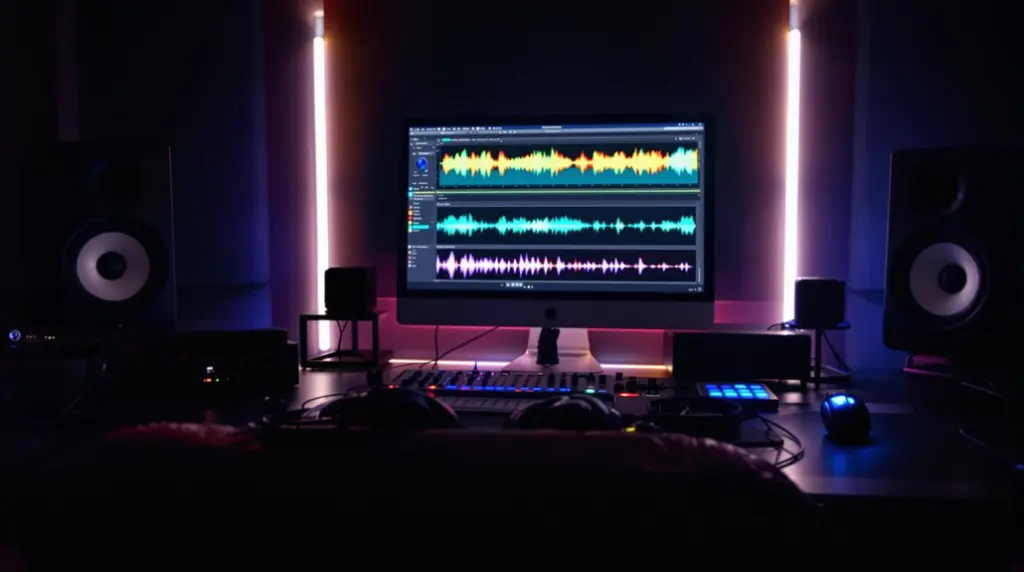AI offers a revolutionary leap for your future music mastering. It introduces detailed, genre-specific customization that aligns with your artistic vision while upholding high industry standards. You’ll benefit from AI’s ability to analyze audio tracks with precision, optimizing sound dynamics, minimizing imperfections, and ensuring consistent audio levels across your work. This technology not only refines sound quality but also greatly reduces costs and democratizes access for independent artists. Additionally, AI-enhanced tools continuously adapt and improve, keeping you at the forefront of audio mastering technology. By embracing AI capabilities, you’ll discover new dimensions in your music production journey.
Key Takeaways
- AI mastering tools will enhance sound clarity and precision, transforming music production quality.
- Automated mastering provides cost-effective solutions, making professional audio accessible to independent artists.
- Future technologies may allow real-time audio mastering adjustments, catering to specific artistic or genre needs.
- Collaborative AI-human interfaces will enable mastering engineers to fine-tune AI outputs, preserving human creativity.
- Ethical considerations will need addressing, particularly in transparency and potential biases within AI algorithms.
AI-Enhanced Mastering Tools
AI-enhanced mastering tools employ sophisticated algorithms to precisely analyze and efficiently process audio tracks. You’ll find these tools aren’t only about automation but also about customization. They provide a plethora of customizable features that allow you to tailor the mastering process to your specific needs. Whether you’re working on hip-hop, classical, or any genre in-between, these tools can adapt the processing to enhance the genre-specific characteristics of your music.
Moreover, these AI tools are designed to meet and even set industry standards. They incorporate advanced technical capabilities that align with the demands of professional audio production environments. This alignment guarantees that your mastered tracks aren’t just sonically pleasing but also competitive in the dynamic landscape of the music industry. The ability to adjust compression, EQ settings, and other mastering elements according to both personal taste and professional benchmarks underscores the versatility and power of AI in this field.
You’re equipped to approach music mastering with a tool that complements human expertise, ensuring that your artistic vision is realized while maintaining technical excellence. This dual capacity of AI mastering tools enhances your creative workflow and upholds the high standards expected in the music industry today.
Impact on Audio Quality
As you explore the impact of AI on music mastering, it’s essential to contemplate how these technologies enhance sound clarity and maintain consistent audio levels.
AI algorithms enable precise adjustments to the audio spectrum, ensuring that clarity isn’t sacrificed for loudness or vice versa. This balance is important for producing a polished, professional sound that stands out in today’s competitive music industry.
Enhanced Sound Clarity
AI mastering technologies meticulously analyze and process audio tracks to enhance sound clarity with unprecedented precision.
By leveraging advanced algorithms, these tools can pinpoint and rectify imperfections that previously might’ve gone unnoticed. This improved accuracy in detection leads to a significant enhancement in audio quality.
The capabilities extend to optimizing sound dynamics, ensuring a balanced frequency spectrum and refined stereo imaging. This meticulous attention to detail results in a clearer and more defined audio output with minimized distortion, noise, and unwanted artifacts.
You’ll notice that AI-driven mastering not only elevates the listening experience but also maintains enhanced precision across various playback systems, ensuring the artist’s vision is conveyed flawlessly every time.
Consistent Audio Levels
Mastering tools powered by AI guarantee that audio levels remain consistent across tracks, greatly enhancing the quality and balance of your listening experience. These tools achieve audio uniformity with remarkable level precision, ensuring that each song in your playlist stands out without overshadowing others due to volume discrepancies.
- Smooth Shifts: Imagine moving from track to track without abrupt changes in volume, preserving the emotional flow of your music.
- Balanced Soundscapes: Envision each instrument and vocal line clearly defined, yet perfectly integrated within the whole mix.
- Professional Output: Picture your music sounding polished and cohesive, just as it would in a top-tier mastering studio.
AI’s impact on mastering transforms how you perceive and enjoy music, setting a new standard in audio production.
Cost Efficiency in Mastering
By automating the mastering process, AI technology greatly reduces the costs associated with traditional mastering, enabling both new and established artists to achieve professional audio quality more affordably. This shift not only improves workflow but also introduces budget-friendly solutions into the music production landscape.
AI mastering eliminates the need for extensive studio time and the high fees of professional engineers. This democratization of mastering means you don’t have to invest heavily to get that top-tier sound. Additionally, the streamlined process reduces turnaround times, enhancing your productivity and allowing you to focus more on creative aspects.
Below is a detailed comparison of traditional vs. AI mastering costs:
| Expense Category | Traditional Mastering | AI Mastering |
|---|---|---|
| Engineer Fees | High | None |
| Studio Booking | Required | Not needed |
| Equipment Investment | Substantial | Minimal |
| Time Efficiency | Lower | Higher |
| Access to Upgrades | Limited | Continuous |
This table highlights how AI mastering isn’t just a cost-effective alternative; it’s a completely transformative approach that reshapes financial expectations and resources allocation in music production. It’s a clear win for anyone looking to optimize production costs while maintaining high-quality output.
Accessibility for Independent Artists
Independent artists now have the tools to access high-quality mastering services affordably, thanks to advancements in AI technology. This shift isn’t just enhancing quality but also democratizing music production, allowing you to achieve professional sound without breaking the bank. Platforms like LANDR are at the forefront, offering AI-driven mastering that tailors the audio dynamics meticulously to suit various music styles. This is important for you as an independent artist aiming to stand out in a crowded market.
Utilizing AI in music mastering, you can expect:
- Essential quality: AI algorithms provide consistent quality across your tracks, ensuring each song meets industry standards.
- Swift turnaround times: AI systems work remarkably fast, reducing the waiting period from days to minutes.
- Tailorable outputs: AI tools often include adjustable settings to fine-tune the final sound according to your personal preferences or genre-specific needs.
This technology is empowering artists by providing tools previously exclusive to well-funded studios. As AI mastering becomes more refined, it continues to level the playing field, allowing you to focus more on creativity and less on logistical constraints. This is how AI isn’t only transforming but also democratizing the music industry, making high-quality production accessible to all.
Ethical Considerations in AI
While AI technology greatly enhances music mastering accessibility for artists like you, it also introduces complex ethical considerations that need careful examination. Transparency issues are at the forefront. You’re entitled to understand how the algorithms that master your tracks operate. However, the opacity of these AI systems can obscure the data usage and decision-making processes, leaving you unsure about how your music is being altered.
Bias concerns are equally critical. AI systems are only as unbiased as the data they’re trained on. If the underlying dataset has historical biases, the AI might replicate these in your mastered tracks, potentially favoring certain types of music or sounds over others. This could skew the diversity and fairness in music mastering.
Furthermore, the integration of AI in mastering raises questions about the displacement of skilled professionals. As you embrace AI tools, it’s essential to contemplate the impact on mastering engineers whose expertise and nuanced ears have traditionally shaped music production.
Lastly, balancing AI automation with human creativity poses a significant ethical dilemma. While AI can handle technical aspects efficiently, the creative decisions should ideally remain in your hands to preserve artistic integrity. These aren’t just technical issues but are central to how you and your audience experience music.
Future Mastering Technologies
As the landscape of music mastering evolves, future technologies are increasingly leveraging sophisticated AI algorithms to enhance audio processing and customization. You’ll find that AI-driven tools aren’t just about guaranteeing; they’re transforming how music sounds in profound ways. With AI, personalized settings become more accessible, allowing for genre-specific mastering that aligns perfectly with the desired artistic intent. This level of customization is unprecedented and pivotal for emerging and established artists alike.
Imagine the future of mastering with these advancements:
- Dynamic Adaptation: AI algorithms will automatically adjust processing techniques based on real-time analysis of audio properties, ensuring top-notch sound quality across various playback systems.
- Genre-Specific Mastering Profiles: Tailored presets for genres from classical to hip-hop, each fine-tuned by AI to enhance the distinctive elements of each style.
- Collaborative AI-Human Interfaces: Interfaces that allow mastering engineers to tweak AI suggestions, combining technological precision with human creativity for unparalleled results.
These technologies aren’t just about automation; they’re about enhancing the creative capacity of mastering engineers. The hybrid approach ensures that the soul of the music isn’t lost to algorithms, bridging the gap between artistic nuance and technical perfection. This is the future where technology meets art in mastering studios.
Frequently Asked Questions
How Will AI Impact the Future of Music?
AI will drastically shape your music experience, enhancing AI composition and creating personalized playlists that match your preferences with unprecedented precision, ultimately transforming how music is produced, shared, and consumed globally.
What Does AI Mastering Do?
AI mastering automates the audio optimization process, enhancing sound quality through adaptive EQ, compression, and limiting. It boosts automation efficiency and sound personalization, tailoring outputs to specific genre characteristics and artist preferences.
What Does AI Mean for Music?
AI means enhanced creative augmentation for your music, where automated tools refine sound quality. Yet, you’ll face ethical implications regarding originality and human input, demanding careful consideration of its role in your creative process.
Can I Use AI to Mix and Master Music?
Yes, you can use AI to mix and master music, balancing creative autonomy with the efficiency of automated tools, though it lacks the nuanced human touch that traditional mastering often incorporates.
Conclusion
As you consider the integration of AI in music mastering, it’s evident that AI-enhanced tools can greatly enhance audio quality while reducing costs. This democratizes access for independent artists, allowing them to produce professionally mastered tracks affordably.
However, you must navigate ethical considerations carefully, ensuring authenticity and creative integrity are maintained.
Looking ahead, anticipate even more advanced AI technologies that further refine mastering processes, making high-quality music production more accessible and efficient than ever before.




